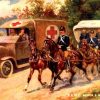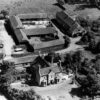Ian Norris recalls that when he was a boy, he and his brothers Bernard and Gerald would go fishing for eels during the summer. They went to the River Devon, along Devon Lane or to the river on the other side of Normanton Lane below two willow trees facing each other. They would bait lines and dangle in the Devon. The bait might be a meat scrap, a worm or a chunk of bread. Early the next morning, at about five o’clock, the brothers would check their lines.
All being well, there were eels to take home. Mrs Norris would soak their catch in salt water – “for eels are omnivores and bottom feeders and have a certain earthy taste unless cleaned well.” Mrs Norris would skin the eels before be-heading, gutting and dipping them in flour for a breakfast fry-up of eels and toast. The Norris boys were not quite so particular and would clean, behead and gut the eels but cook them in their skins!
Bernard would earn “some pennies” by selling eels to Jack Daybell who lived on Butcher Row. He would eat them for his breakfast.
It was possible to find other rations along the River Devon. People were allowed to keep their ducks along the river and if eggs were discovered, especially on the riverbed, “then the eggs were there for the taking.” Perhaps ducks may have disappeared as well!
It was also possible to forage for moorhen’s eggs by tying a spoon on a piece of string and scooping the egg out of the nest.
During the war, a family would have rabbit on the menu at least once a week – roast rabbit, rabbit stew or rabbit pie. The linesmen on the railway had a duty to keep the lines free and keep the rabbit population down. So it was usual to see the men wheeling their bicycles along the road, with ten or so rabbits on their handlebars – all for sale.









No Comments
Add a comment about this page